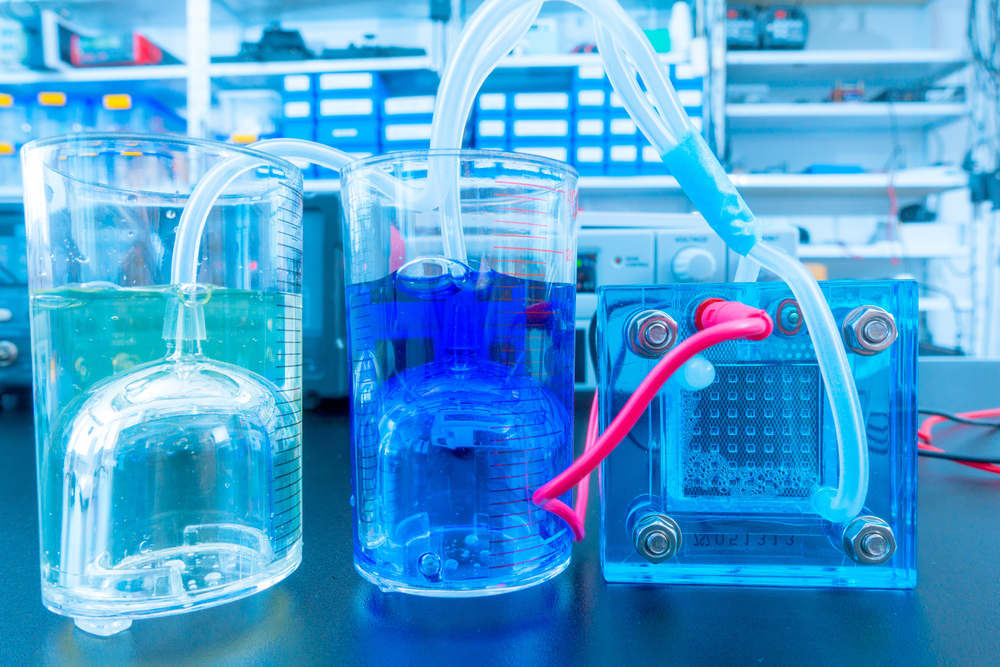What are Fuel Cells?
Fuel cells use the chemical energy of hydrogen or an alternative fuel to cleanly and efficiently produce electricity. Using hydrogen as the fuel only produces water, heat, and electricity. Hydrogen (the fuel) is supplied continuously, unlike in a battery, and a dynamic equilibrium is maintained.
Benefits of Fuel Cell Studies
Fuel cells convert chemical energy directly into electrochemical work, without the need to go through an intermediate thermal conversion. As such, fuel cells are not limited by Carnot’s theorem and the second law of thermodynamics does not apply, this means that they can provide extremely high electrical efficiencies.
Fuel cells have the capacity to overshadow many traditional technologies in a number of markets, from tiny batteries and sensors to multimegawatt power plants. Fuel cells have a high potential efficiency, ultralow emissions and quiet operation. In addition, as long as a fuel is provided, fuel cells do not run down like batteries and do not need recharging.

Main Areas of Fuel Cell Studies
There are four main types of fuel cells which are currently in development. These are: Phosphoric Acid (PAFC), Proton-Exchange Membrane (PEMFC), Molten Carbonate (MCFC) and Solid Oxide (SOFC).
At the beginning of the 21st century, car manufacturers across the world had large teams working on vehicle fuel cell studies. Most of these focused on gasoline or hydrogen, however, storing hydrogen in vehicles can be problematic and as such liquid fuels like ethanol have been considered as a hydrogen source.
Fuel cells are attractive for motor vehicles as they have low emissions and good levels of efficiency with minimal formation of pollutants such as NOx. Fuel cells are now deemed to be a long-term replacement for the engines inside hybrid vehicles.
Fuel cell studies are ongoing for the development of cells for both stationary and mobile applications. They can provide power for extremely large systems such as a utility power station but they can equally be used for laptop computers.
How can Hiden Analytical Assist Fuel Cell Studies?
Hiden Analytical is at the forefront of the production of advanced mass spectrometers for fuel cell studies. We offer a wide range of solutions with the goal of following gas compositions for fast acquisition of temperature-dependent reaction dynamics. This data can then be applied as a measure of electrocatalytic efficiency.
Electricity is produced by SOFCs by sandwiching a dense ceramic electrolyte such as yttria-stabilized zirconia between an anode and a cathode. Fuel is then fed to the anode where it is catalytically divided into protons and electrons. Electrons migrate through an internal circuit to the cathode, creating a flow of electricity.
Some fuel cell studies attempt to harness the heat emitted by this reaction whereas others aim to mitigate operating temperature to enhance safety and efficiency.
Our spectrometers are also ideal for analyzing PA leakage in PA-doped polybenzimidazole membrane fuel cells in real time. The PA concentration of a membrane can affect the performance of a fuel cell and our spectrometers can ensure this level is managed. Hiden spectrometers are also suitable for screening vanadium-based catalysts to determine hydrogen sulfide (H2S) abatement from biogas. This can be a key step in feeding MCFCs.
We also supply a number of gas analyzers which can be used for R&D and process control of fuel cells, supporting efficiency in electrochemical alternatives to petroleum-based fuels. They can analyze reaction mixtures and product composition reliably, which helps the overall efficiency by detecting impurities in the hydrogen. The HPR-20 is a specialist system for gas analysis, engineered for advanced fuel cell research and development. This high-precision mass spectrometer is created to monitor evolved gases and vapors with a read-in thermocouple which is capable of incorporating temperature into the data display. This is perfect for fuel cell studies which are aimed at increasing exothermic performance. If you would like to learn more, please contact one of our team today.

